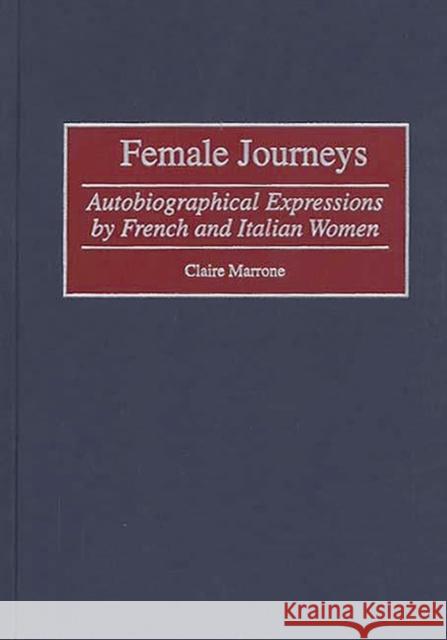Female Journeys: Autobiographical Expressions by French and Italian Women » książka
Female Journeys: Autobiographical Expressions by French and Italian Women
ISBN-13: 9780313307270 / Angielski / Twarda / 2000 / 200 str.
In this study of 19th- and 20th-century French and Italian women's autobiography, the author illustrates how the protagonists' development unfolds through separation from oppressive social and familial structures. Reading the selected life stories as bildungsromane and drawing on an array of both canonical and noncanonical texts in the various autobiographical subgenres, Marrone concludes that the heroines' movements away from oppressive structures are not limited to particular historical periods but are motivated by historical and cultural circumstances. She thoughtfully traces the reasons why a 19th-century protagonist might leave her country, a turn-of-the century heroine might flee her family, and a modern female character might separate from her mother, carefully examining their motivations and their goals. In telling their stories, she concludes, women writers continually challenge existing autobiographical conventions. Marrone finds that postmodern texts prove that the journey toward selfhood may be an ongoing one, one that unfolds through the creation of multiple life stories.
The author begins her study with a consideration of the tradition of women's autobiography in French and Italian literature of the 19th- and 20th-centuries. Using several examples from various genres, she brings issues of gender oppression, marital abuse, sexuality, and motherhood to the forefront of the discussion. She continues by analyzing the genres of autobiography and bildungsroman--where they overlap and where they diverge, specifically in women's writing. Turning to specific authors and their works, Marrone moves on to an analysis of the writings of Cristina Trivulzio di Belgiojoso, C DEGREESD'eleste Mogador, Sibilla Aleramo, Oriana Fallaci, Marie Cardinal, and Annie Ernaux. In examining the works of these writers, the author concludes that women writers continue to attempt to define themselves in their own voices. Marrone finds that postmodern writers participate in innovative experimentation in life writing: hybrid texts, creative auto/biographies, and collective life stories. This clearly written, engaging volume is a pivotal addition to the growing field of literature on autobiography.











